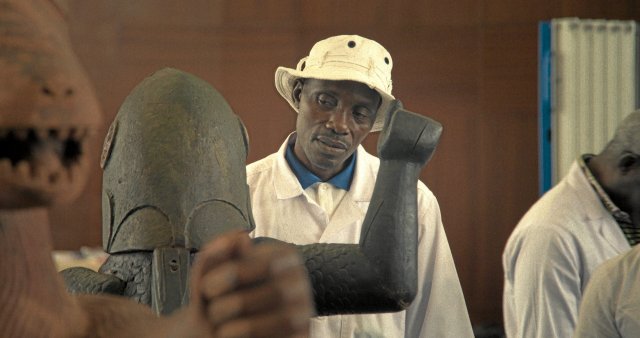Finally back in the old homeland – Benin bronzes stolen by France
Foto: The Ball Films – Fanta Sy
The display cases are slowly emptying. Large wooden statues are dismantled, carefully placed in large boxes and padded – and prepared for a long journey. The art treasures are returning to their homeland, to the former kingdom of Dahomey, today’s Benin. They were stolen from Abomey, the capital of the kingdom, by French colonial troops in 1892. After French President Emmanuel Macron announced that he would restitute African art objects, an initial 26 objects will actually be returned in 2021.
The French-Senegalese director Mati Diop, known for the feature film “Atlantique,” which won the Grand Prix in Cannes in 2019, accompanied the art treasures on their way from the Quai Branly Museum in Paris to Benin. Her documentary “Dahomey,” which is peppered with fantastic elements, is running in competition at the Berlinale. Diop gives the art treasures themselves a voice and describes the long journey from their perspective. This begins in the deep darkness of a large wooden box that is tightly closed. All you can hear is the roar of the tools, and you can see: nothing.
King Gezo ruled the kingdom from 1818 to 1858. His statue raises a clenched fist in a combative manner. These are words that the Haitian writer Makenzy Orcel puts into the king’s mouth. From his prison, Gezo reports the feeling of being torn away and uprooted. »They called me 26. Why don’t people call me by my name? Don’t you know him?” he asks in the box. The stolen art treasure reflects his time as a prisoner in France. “The chains are still rattling in my head.” The wistful, accusatory words of the statue contrast with the sober surroundings, the large, empty rooms in the museum, and the process of packing and transport.
In Benin there is a completely different picture: Here Gezo and the 25 other art treasures are welcomed with a big ceremony. After landing in the capital Cotonou, they are driven to the presidential palace by truck with pictures symbolizing the cultural assets. People dance and sing on the side of the road. “Historique!” (Historical!) is the headline of a newspaper. In the old home, showcases will be set up in which Gezo and the other art treasures will be shown in a noble ambience. It becomes clear: the return is a major event for Benin.
But what does restitution actually mean in terms of the colonial past? What good does such an act do – for whom? To discuss such questions, Mati Diop invited students from the University of Abomey-Calavi to a panel discussion for her film. A controversial, fiery debate ensues in which different feelings and views are articulated. This scene is the heart of the film, in which many of the complex questions surrounding the topic of restitution are addressed. Of around 7,000 stolen art treasures, 26 were returned. Is this a serious beginning, a glimmer of hope? Opinions are divided. Some see the act of return as a fig leaf. “It’s about France making a good impression.”
On the other hand, students emphasize how important it is that at least the first artifacts have been returned. They acknowledge that this has finally been achieved and that it is now possible for people in Benin to have access to this part of their own cultural heritage. There is a strong need to deal with one’s own history and tradition. One student explains how her emotions overwhelmed her when she saw the art treasures for the first time. “I cried for 15 minutes.” Another says that the objects and their religious meaning are scary to her. Other students are thinking about how the objects that are now in the museum can be made accessible to children from less privileged families.
“Dahomey” raises many central questions about the restitution of stolen art treasures – in just 67 minutes. It can be good for films if directors manage to get to the heart of a complex topic. With “Dahomey,” however, there would have been potential to delve deeper into the subject matter – for example, with regard to information about the objects. Diop focuses more on a fantastical approach, giving King Gezo a mysterious life of his own with a heavily distorted voice. This is a legitimate approach to show that art treasures are more than soulless objects. Nevertheless, Gezo remains little accessible.
When she heard about Macron’s restitution announcement, her first impulse was to make a feature film, Diop said at a press conference during the Berlinale. But at the time she didn’t believe that the promise would be followed by action so quickly. She realized: This is something incredibly important that needs to be recorded.
»Dahomey«: France/Senegal/Benin 2024. Director and screenplay: Mati Diop. 67 min. Date: February 25th, 9.30 p.m. Berlinale Palast.
Subscribe to the “nd”

Being left is complicated.
We keep track!
With our digital promotional subscription you can read all issues of »nd« digitally (nd.App or nd.Epaper) for little money at home or on the go.
Subscribe now!
sbobet88 judi bola online judi bola sbobet88
